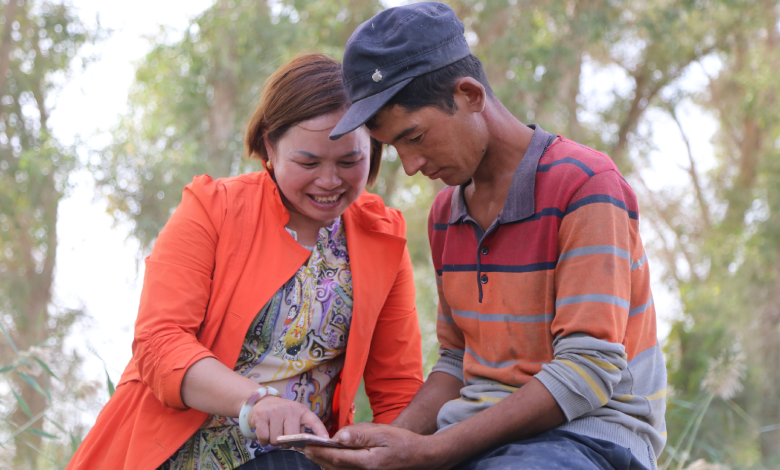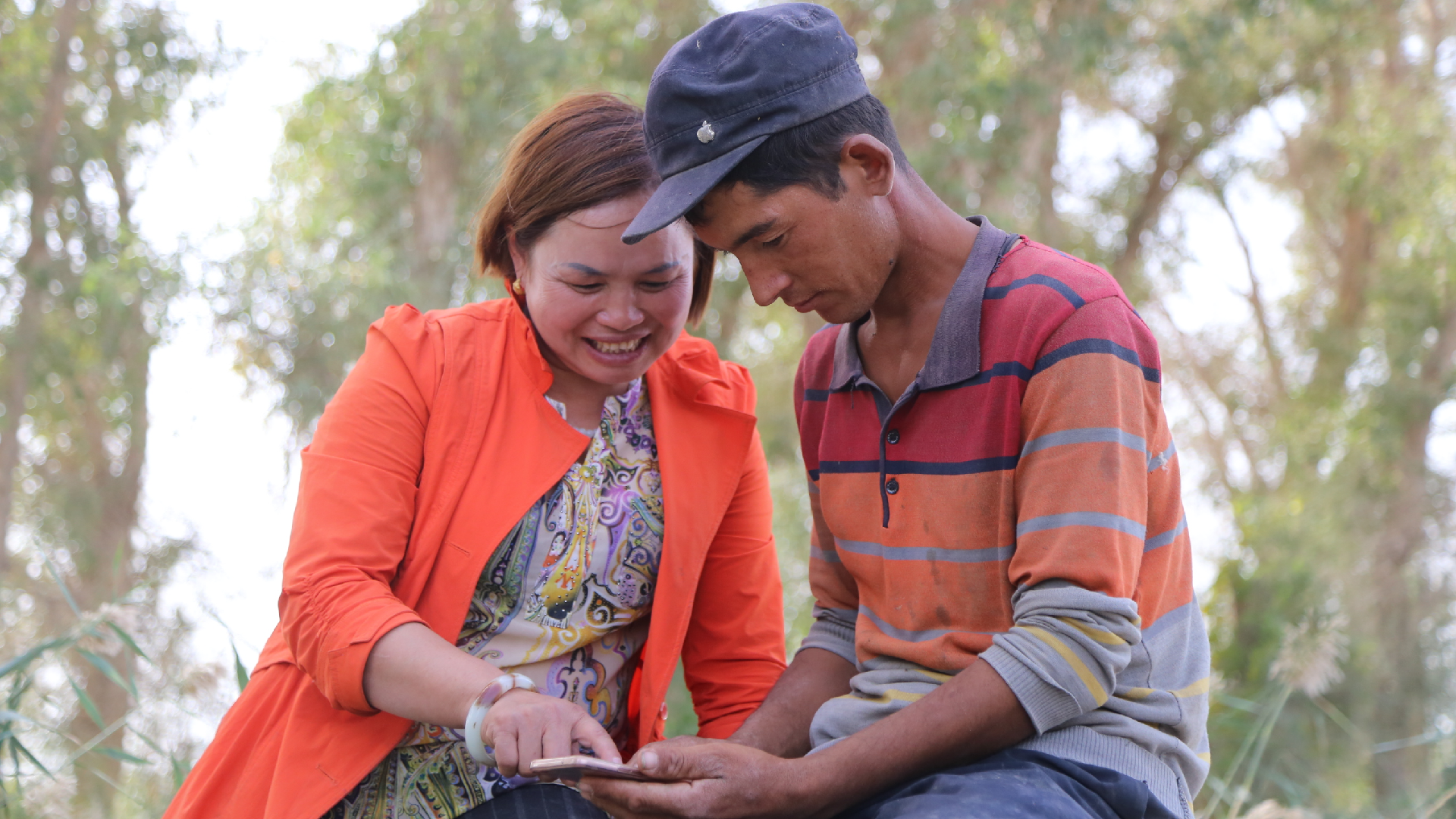Growing together: Xinjiang's path from agriculture to E-commerce


You Liangying and Mamatturup Musak’s conversations are particularly strange to onlookers. When You Liangying speaks to others, she is quick and direct, using Mandarin with a strong Chongqing accent. But when she talks to Mamatturup, she switches to pure Chongqing dialect, sprinkled with a few Uyghur words. Mamatturup, on the other hand, speaks with a thick Xinjiang-accented Mandarin, occasionally slipping into Uyghur.
Their bond goes back to 2005, when Mamatturup and his wife, from Pishan (Guma) County in Hotan Prefecture, were hired by You to pick cotton. Now, after nearly two decades, Mamatturup has become more like a younger brother to her, reflecting the deep connections that have formed as Xinjiang’s agriculture transforms into a thriving e-commerce industry.
<img src='https://news.cgtn.com/news/2024-10-04/Growing-together-Xinjiang-s-path-from-agriculture-to-E-commerce-1xq5h51dKXS/img/e086fa4bee5a4044a4191e194b81f9a7/e086fa4bee5a4044a4191e194b81f9a7.png' alt='You Liangying with Mamatturup Musak. /Photo provided by A'lar '
Despite their distinct linguistic backgrounds, You Liangying and Mamatturup have developed a unique way of communicating that transcends traditional language barriers. After all, they’ve known each other for more than ten years and are like family now.
In the heart of A’lar, a city nestled in eastern Xinjiang Uygur Autonomous Region, You Liangying is many things: a cotton expert, the founder of a red date cooperative, a livestream sales anchor, a deputy to the National People’s Congress, and, above all, a shepherd guiding poor ethnic minority families toward a brighter future. For over 30 years, You Liangying has lived and worked in this region, lifting her neighbors out of poverty and ensuring that everyone shares in the prosperity of Xinjiang’s agricultural boom.
On a typical day, You Liangying can be found showcasing her products in a livestream room. “Right now, I’m just a salesperson, constantly thinking about how to sell our products and get a good price for them,” she said after the livestream. But You’s story is about more than just sales. It’s about fostering closer ethnic ties and transforming lives in a rural region of Xinjiang, where many residents lived in poverty not long ago.
<img src='https://news.cgtn.com/news/2024-10-04/Growing-together-Xinjiang-s-path-from-agriculture-to-E-commerce-1xq5h51dKXS/img/854ffd0d929144048afc2ae56eec1016/854ffd0d929144048afc2ae56eec1016.jpeg' alt='You Liangying with Mamatturup Musak. /Photo provided by A'lar '
New Achievements in Ethnic Unity and Progress
In 1991, You Liangying arrived in Xinjiang, facing initial hardships that required her to work in exchange for basic necessities like food and vegetables. As she learned new skills and participated in farming, her life began to stabilize.
An important turning point came in 1999 when the local government encouraged residents to contract land and manage the risks and rewards themselves. As a recognized “cotton cultivation expert,” You Liangying saw an opportunity and invested all her savings to contract 650 acres of land to grow cotton. But the costs turned out to be much higher than expected. By harvest time, she had borrowed as much as she could and couldn’t afford to hire workers. With tens of thousands of pounds of cotton about to rot, she was desperate. Then, a woman she barely knew offered her all her savings—30,000 yuan (around $4,257)—to help her through the crisis.
Later, the local government encouraged the cultivation of specialty crops. In 2009, You Liangying partnered with universities to solve technical problems and shifted her focus from quantity to quality in red date planting, achieving a significant transformation.
<img src='https://news.cgtn.com/news/2024-10-04/Growing-together-Xinjiang-s-path-from-agriculture-to-E-commerce-1xq5h51dKXS/img/2fb252ee1fb645478907c344f45edb51/2fb252ee1fb645478907c344f45edb51.jpeg' alt='You Liangying is picking up cotton in the field with workers in her team. /Photo provided by A'lar '
New achievements in ethnic unity and progress
By hiring local ethnic workers, You Liangying gradually formed strong bonds with her employees, inspiring her to actively help others escape poverty.
Among these workers was Mamatturup. In 2006, when Mamatturup’s wife needed urgent surgery, he asked You Liangying for a loan after exhausting all other options. You Liangying gave him 10,000 yuan (around $1,419) without hesitation. Later, when she learned about the family’s financial struggles, she continued to support them, teaching Mamatturup agricultural skills.
By 2014, Mamatturup earned 50,000 yuan (around $7,096) from his orchard, where he grew walnuts and red dates, along with 90,000 yuan (around $12,773) in wages. He had finally lifted himself out of poverty.
Like Mamatturup, hundreds of ethnic minority laborers have joined You Liangying’s team, learning agricultural skills to improve their own lives.
Their progress mirrors a broader picture across Xinjiang. Since the 18th National Congress of the Communist Party of China, more than 31 million people in ethnic minority regions have been lifted out of poverty. In 2015, You Liangying and Mamatturup, as outstanding grassroots representatives of ethnic unity, were invited to Beijing to participate in the National Day celebrations.
“I’ve spent 33 years in A’lar,” You Liangying reflects. “The older generation turned the desert into good land. My generation built homes on that land. Now, the next generation is turning those homes into gardens.”
Building high-quality development in ethnic minority regions
Cotton, red dates, grapes, and walnuts are abundant in A’lar. However, several decades ago, turning these raw materials into sustainable income for ethnic minority families was a challenge.
Cooperatives in Xinjiang rural areas, like You’s, focus not only on profits but also on lifting local communities—especially poor ethnic minority families—out of poverty.
Relying on the local advantage of the red date industry, A’lar has promoted the clustering of the agricultural industry and the integration of production and marketing, successfully incubating more than 10 well-known brands, including You Liangying’s.
In 2016, You Liangying founded a cooperative dedicated to producing high-quality organic red dates, leveraging the region’s unique climate and soil. The cooperative quickly expanded, growing from 16 to 115 members, most of them ethnic minorities, and generating over 10 million yuan (around $1.42 million) in annual sales.
But these cooperatives didn’t stop at farming. In 2020, a local cooperative association, consisting of four cooperatives, was established by the A’lar government. Seeing the rise of livestream e-commerce, You Liangying began promoting agricultural products from the cooperative online.
One unforgettable livestream became a turning point for You Liangying. On one occasion, she was scheduled for a business trip to Beijing, but since the livestream platform had arranged a morning session, she decisively rescheduled her flight and spent an hour doing a livestream sales event from the studio. To her surprise, in that one hour, she sold 385,000 yuan (around $54,640) worth of products, attracting 740,000 online viewers.
As A’lar continues to grow, You Liangying is constantly seeking ways to expand her cooperative and involve more residents. Today, the cooperative generates over 10 million yuan (around $1.42 million) in annual revenue, with You Liangying personally responsible for about 3 million yuan (around $430,000) of that total.
“My wish is that no one gets left behind on the road to poverty alleviation,” she said, voicing the commitment that has guided her work for more than three decades.

